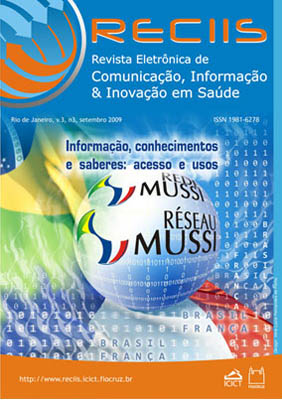Information, communication and anthropology of knowledge
DOI:
https://doi.org/10.3395/reciis.v3i3.754Keywords:
Document, semiopragmatic, dirscursive formation, social representation, usageAbstract
In Lille, ICS (Information and Communication Sciences) research revolves around the concept of anthropology of knowledge, and is strongly supported by textual sciences. Since the bond between communication and information was a core concern, the ideas of “text” or “enunciation” were used with a very broad meaning, according to a pragmatic approach that takes into consideration semiotic, social and technical contexts. At this moment of widespread computerization, researchers become more centered on evolutionary rather than mediatic principles, always reaching new levels and acquiring new shapes. It is about studying the constitution, circulation and appropriation of knowledge under a perspective that is both systemic and phenomenologic.Published
How to Cite
Issue
Section
License
Author’s rights: The author retains unrestricted rights over his work.
Rights to reuse: Reciis adopts the Creative Commons License, CC BY-NC non-commercial attribution according to the Policy on Open Access to Knowledge by Oswaldo Cruz Foundation. With this license, access, download, copy, print, share, reuse, and distribution of articles is allowed, provided that it is for non-commercial use and with source citation, granting proper authorship credits and reference to Reciis. In such cases, no permission is required from the authors or editors.
Rights of authors’s deposit / self-archiving: The authors are encouraged to deposit the published version, along with the link of their article in Reciis, in institutional repositories.












